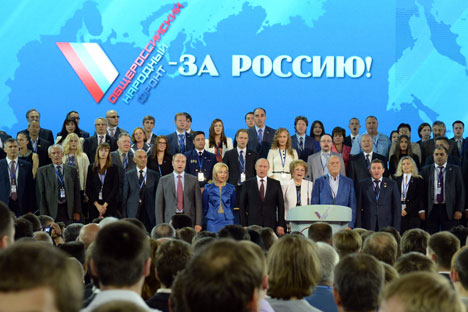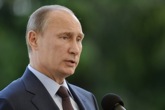Front for a New Perestroika?

Vladimir Putin (center) was elected as a leader of the Russian Popular Front on June 12. Source: Kommersant
The foundation congress of the 'Popular Front – For Russia' and unanimous election of President Vladimir Vladimir Putin as its leader was perhaps one of the most significant events of the month in Russia's internal politics. The second event worth noting is Putin declaring his support for amnesty to thousands of small and medium businessmen, who are languishing in prisons for various economic crimes. Although the two events look unrelated, they are likely to have a long-term impact on the development of the country. Anyone, who has been very closely following the developments in Russia since the Soviet collapse, cannot to fail to see the symptoms of stagnation in the political and economic life of the country.
The country needs a new Perestroikato move forward in the political, economic and social development and industrial modernisation. Today, except for a generally accepted national leader like Vladimir Putin, there is no responsible political force in the country capable of galvanising the Russian society for achieving these vital goals.
A lot has been said and written by Putin-bashers and his admirers about ONF – the Russian acronym for All-Russia Popular Front, floated two years ago to assist in his presidential campaign. In its new avatar as a nationwide movement transcending political, ideological and social affiliations it, at least theoretically, provides a platform for all the forces to work for the benefit of Russia under a generally acknowledged and accepted national leader, which no doubt Mr Putin still remains.
Related:

Putin pledges to support perinatal medicine
The Kremlin's mega-bridges to nowhere
Foreign investors in Russia hesitant despite Putin promises
Russia to experience demographic gap in years to come - Putin
Many see it as a tool for Mr Putin to manipulate the Russian society and subtly replace the ruling United Russia party, which in the opposition media is referred as the 'party of thugs and thieves'. To be frank, it would be foolish to believe that the Russian president does not feel the pulse of the nation. As a political leader with a degree of credibility and legitimacy, Mr Putin cannot be denied the right to create political parties or alliances to serve his political agenda and goals.
President Putin is obviously shifting his support base from the United Russia, now formally headed by Prime Minister Dmitry Medvedev.
In his first two terms President Vladimir Putin managed to overcome the chaos and paralysis of power in the post-Communist nuclear giant and restored elementary order after the murky 1990s.
After his re-election in March 2012, the president seems to be finally shifting his economic policies. His announcement seeking amnesty for convicted businessmen is a major indicator of the government's readiness to create a conducive climate for entrepreneurs. According to the business ombudsman Boris Titov, thousands of entrepreneurs serving prison terms would be freed within six months after State Duma votes for the amnesty. Amnesty, however, would apply only to first time convicts, not involved in violent and hostile takeovers and who have agreed to compensate damages.
In a major breakthrough, at the St. Petersburg International Economic Forum the Russian president announced plans to open the rainy day kitty – Welfare Fund to invest more than $43 billion on major infrastructure projects including the modernisation of road network around Moscow, high speed railway from Moscow to Kazan the capital of internal republic of Tatarstan and modernisation of the Trans-Siberian Trunk Railway, the world’s longest railway line, which links Moscow with Vladivostok on Russia's Pacific Coast. The argument you hear in Moscow is: 'China grows because it spends on long-term infrastructure projects, we have money to spend because we are as prudent as Germany.'
However, many fear that most of these funds would be siphoned off by corrupt officials. This is where precisely the 'Popular Front – For Russia' steps in as a watchdog. It is structured to have access to the public at the grass-root level and geared to provide feedback to its leader. This way, Mr Putin would be the first Russian leader since Soviet collapse to have grass-root access to his countrymen, like in the days of the CPSU, which had its party unit virtually in every apartment bloc.
This would also enable him to launch the process of modernisation of the political system of the country, in which not the moneybags, but gradually maturing electorate would have a major stake.
The 'Popular Front – For Russia' has the potential of becoming the uniting force of the pluralistic society on the ideology of a great Russia. The amnesty of thousands of entrepreneurs languishing in jails, mostly due to their refusal to share profit with corrupt police, heralds the end of 'economic civil war' and beginning of a new much-awaited Perestroika.
All rights reserved by Rossiyskaya Gazeta.
Subscribe
to our newsletter!
Get the week's best stories straight to your inbox